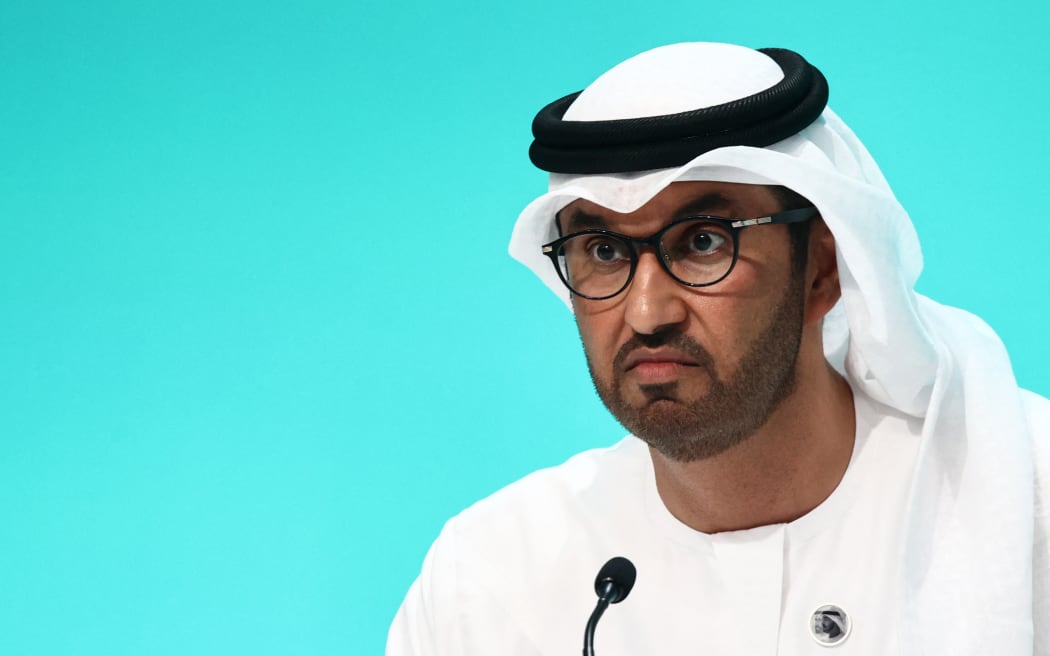It's a massive crowd of international delegations, vested interest groups and businesses - too many, say some climate change experts. But it's pressure that officials at COP28 need to know about.

COP28 President Dr Sultan Al Jaber. Photo: AFP
It could be the most consequential international climate change conference yet, but it's being held in the United Arab Emirates, one of the world's major oil producers and led by one of the country's top oil bosses.
Newsroom journalist Rod Oram is attending Cop28 and joins The Detail from the apartment he's staying at in Dubai, where he looks through what's either a sunny haze or human-induced smog.
This is the third COP he's covered, after being in Scotland and Egypt over the last two years.
"COP stands for Conference of the Parties - so the parties are all the nations who have signed up to United Nations Framework Convention on Climate Change - in fact, it's now almost every country in the world," Oram says.
"The convention's hugely important because it's a way of codifying where countries stand on climate issues and how they're dealing with them.
The countries come together and try to make agreements on climate change policy. Arguably, the most significant agreement was made at was COP21 at Paris in 2015, when 196 countries agreed to hold global temperature increases to well below 2 degrees above pre-industrial levels.
"There's huge value in countries coming together to negotiate fiercely, share ideas and all the rest," Oram says.
"But outside of negotiations, there's this extraordinary wealth of civil society organisations, research institutes, scientists, academics, NGOs, cultural leaders, faith leaders, businesses, youth, indigenous people coming together because these are all common issues, common to all of humanity, so COPs get bigger and bigger. Glasgow in 2021 was about 40,000 people. Cop 27 last year was 45,000 and we've just passed the 100,000 mark here at Cop 28."
The Ministry of Foreign Affairs and Trade says New Zealand's COP delegation is being led by new climate change minister Simon Watts.
It includes, but isn't limited to, negotiators from the Ministry for the Environment, the Ministry of Foreign Affairs and Trade and the Ministry for Primary Industries, one iwi Māori representative and former climate change minister James Shaw.
Our 2023 delegation is a similar size to previous COPs - last year New Zealand had 24 people. Above that, around 100 New Zealanders, including representatives of New Zealand businesses and organisations are going as "party overflow", allowing people to access some of the COP events.
But Oram says New Zealand has a "low key" profile.
It hasn't had great press this time around either, winning the Climate Action Network's 'Fossil of the Day' award on the first day.
This was for the new government's plan to reintroduce oil and gas exploration. But New Zealand has won this award before, for instance last year, for not supporting setting up a funding pool for loss and damage due to climate change.
And unlike many countries, we don't have a pavilion showcasing what we have done about the issue.
"I don't think any government that I've been following, and I've followed a few now in my 26 years in New Zealand, really understands the value of investing in that kind of programme.
"We have some very good climate structure in New Zealand, like the Zero Carbon Act and the Climate Change Commission, but there is always this huge resistance in New Zealand to spend any money.
Oram says he's still unsure of what the outcome of this conference will be.
"If there is robust language about a phase out of fossil fuels - and out, not phase down - it needn't have a timeframe on it but it needs to have some sort of commitment there - that would be considered a triumph. I think the odds on that are extremely small.
"At the other end of the scale, there could be complete chaos - a rambling agreement with a whole bunch of useful things pulled together and tried to be dressed up as something substantial."
Oram says there's not "the same level of hope" to do anything on fossil fuels, compared to 2015 when the Paris Agreement was signed.
"But there's no doubting in many people's minds that if that happened, this would become the most consequential COP to date."
Check out how to listen to and follow The Detail here.
You can also stay up-to-date by liking us on Facebook or following us on Twitter.

Photo:


